Middle East
Israel says its troops will remain in Gaza, Lebanon and Syria indefinitely | Israel-Palestine conflict News
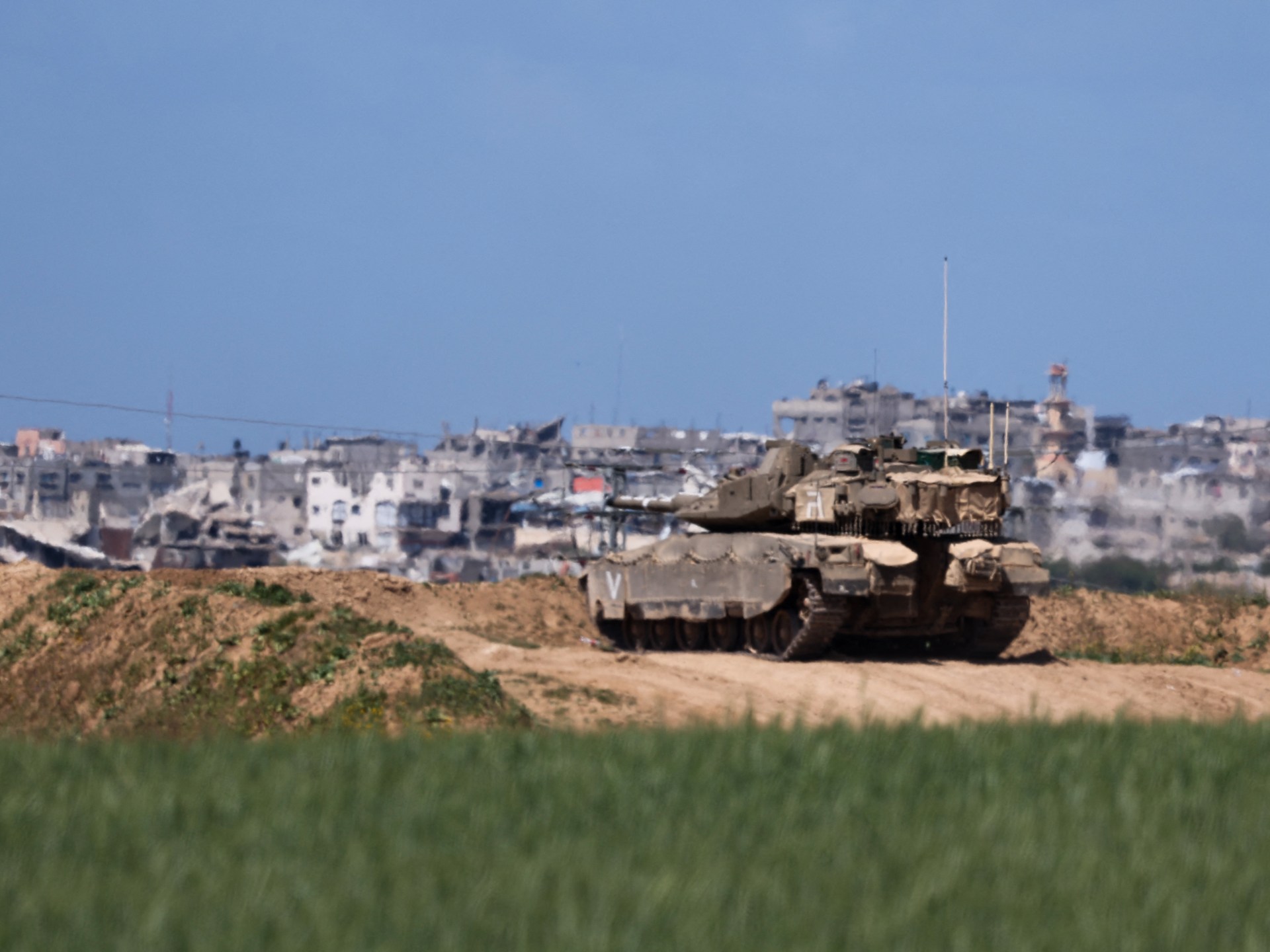
Israel’s defence minister says that Israeli troops will remain in Gaza, Lebanon and Syria indefinitely, as the military tightens its grip on several occupied territories.
“Unlike in the past, the [Israeli military] is not evacuating areas that have been cleared and seized,” Israel Katz said in a statement on Wednesday.
The army “will remain in the security zones as a buffer between the enemy and [Israeli] communities in any temporary or permanent situation in Gaza – as in Lebanon and Syria”, said the statement.
The military said that it had turned 30 percent of Gaza into a “security” buffer zone and struck around 1,200 “terror targets” since resuming its offensive on March 18, following a nearly two-month truce in Gaza with the Palestinian group Hamas.
Israeli Prime Minister Benjamin Netanyahu has vowed to annihilate Hamas and return 59 captives being held by armed groups in Gaza, including 24 who Israel believes are alive. Hamas has said it will not agree to release the captives without a complete Israeli withdrawal from Gaza and a lasting ceasefire.
The Palestinian Islamic Jihad group on Wednesday released a video of captive Rom Braslavski. He appeared to be under duress, said he was covered in sores, and pleaded with Netanyahu to stop the war. The main organisation representing captives’ families accused the Israeli government in a statement of “choosing to seize territory before the hostages”.
Israel says it must maintain control of what it calls “security zones” to prevent a repeat of Hamas’s October 7, 2023 attack in which some 1,139 people were killed and 250 others were abducted – including captives who have already been released by Hamas, and those still being held by the group.
Netanyahu also has said that Israel will implement US President Donald Trump’s proposal for the resettlement of much of Gaza’s population in other countries through what Netanyahu refers to as “voluntary emigration”.
Lebanese President Joseph Aoun said that Israel’s continued presence in some areas of southern Lebanon was “hindering” the Lebanese army’s full deployment as required by the ceasefire between Hezbollah and Israel.
According to the deal signed in November, which ended more than a year of war, both parties agreed to withdraw from southern Lebanon and leave the area to be controlled by the Lebanese army. However, Israel only partially pulled out its troops from the country’s south, leaving soldiers in at least five locations.
Lebanon’s Health Ministry said two Israeli drone strikes in southern Lebanon killed two people on Wednesday. Israeli strikes in Lebanon have killed more than 70 civilians since the ceasefire took effect in November.
Israel also established several military posts inside Syrian territory, including on the summit of Mount Hermon, after warplanes launched hundreds of strikes in the aftermath of the ousting of former Syrian President Bashar al-Assad.
The Israeli government immediately revealed its position towards the new Syrian government led by the former opposition group Hayat Tahrir al-Sham (HTS), calling it “a terror group from Idlib that took Damascus by force”, and has since refused to withdraw from the territories it seized.
‘No humanitarian aid’ to enter Gaza
Katz said in a statement on X that Israel’s policy was “clear”.
“No humanitarian aid will be allowed into Gaza,” the defence minister said on Wednesday.
Preventing humanitarian aid from entering the Gaza Strip “is one of the main pressure tools that stops Hamas from using this means against the population,” he added.
“In the current reality, no one is going to allow any humanitarian aid into Gaza, and no preparations are being made to allow any aid of this kind.”
Israeli Culture Minister Miki Zohar echoed this position, saying, “the despicable murderers in Gaza deserve no humanitarian assistance from any civilian or military mechanism.”
“Only hellfire should be poured on the makers of terrorism until the last hostage returns from Gaza,” Zohar said on X.
Israeli authorities have blocked all aid from entering Gaza for more than six weeks, worsening the already catastrophic humanitarian situation in Gaza.
The United Nations on Wednesday rejected a new authorisation mechanism that purported to introduce greater control over aid delivery in Gaza by Israeli forces, stating that aid organisations already had a mechanism in place to ensure that aid is not diverted to Hamas.
“Aid delivery into Gaza has for too long been obstructed,” the UN said, adding its teams were “ready to deliver assistance to those most in need based on humanitarian principles”.
Meanwhile, Israeli air raids continued on Wednesday, with at least 35 people killed in attacks across Gaza, medical sources told Al Jazeera. Palestinian journalist Fatima Hassouneh and 10 members of her family were killed in an Israeli air strike that targeted their home in Gaza City.
Middle East
Deadly, sombre Good Friday as 58 people killed in Israeli attacks on Gaza | Israel-Palestine conflict News
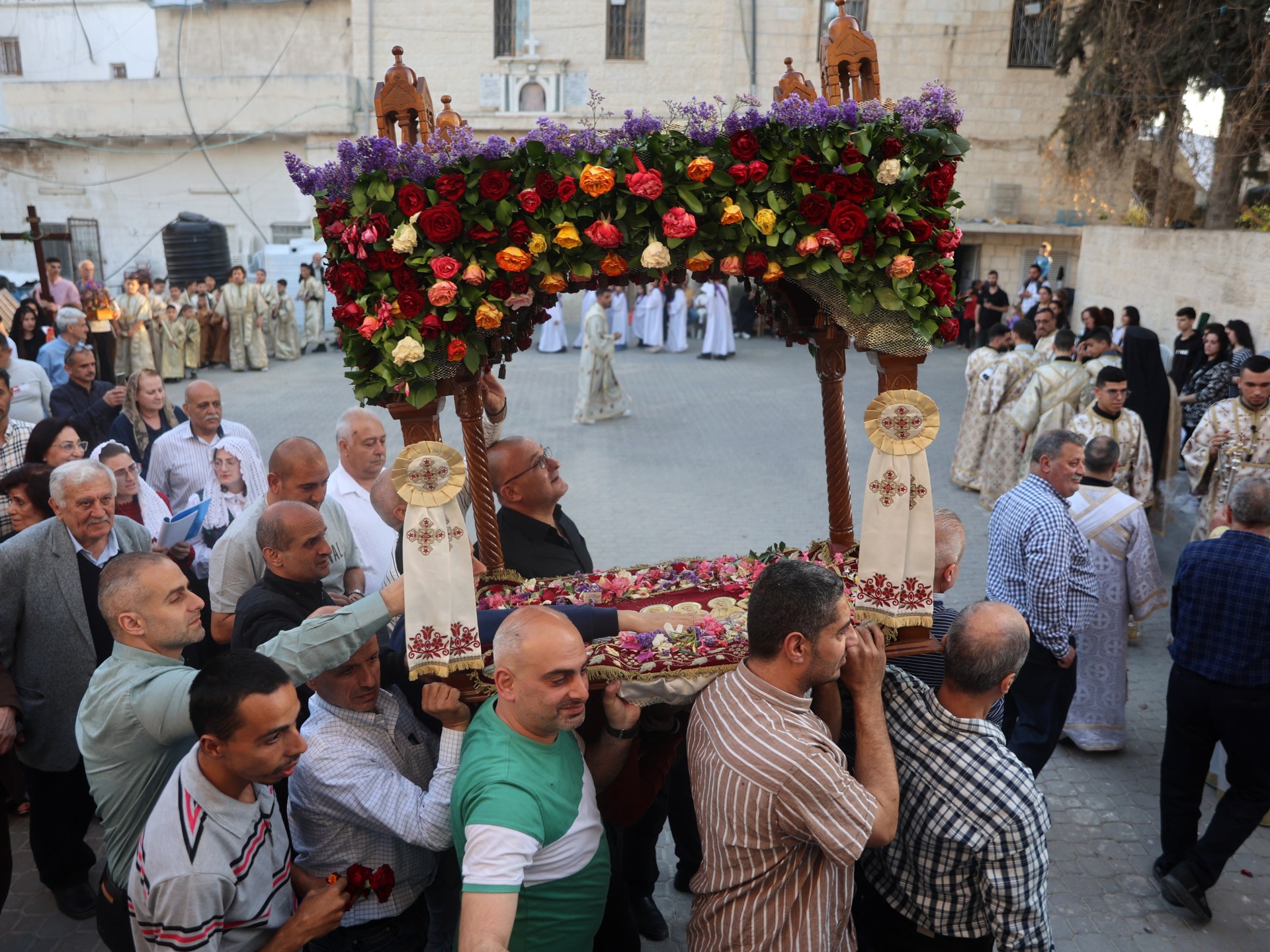
Palestinian Christians in Gaza and the occupied West Bank are holding temperate gatherings leading up to Easter.
Israeli strikes on Gaza have killed at least 58 Palestinians in one day as Christians mark Good Friday in the besieged and bombarded enclave.
More than half of the casualties were in Gaza City and northern Gaza, but deadly attacks took place across the Palestinian Strip, including in Khan Younis and Rafah in the south, medical sources told Al Jazeera on Friday.
The Israeli military said troops were operating in the Shaboura and Tal as-Sultan areas near Rafah, as well as in northern Gaza, where Israel has taken control of large areas east of Gaza City.
On Friday, Israel’s defence minister, Israel Katz, repeated that Israel intended to achieve its war aims.
“The [Israeli army] is currently working towards a decisive victory in all arenas, the release of the hostages, and the defeat of Hamas in Gaza,” he said in a statement.
Palestinian Christians in Gaza however continued to hold temperate gatherings leading up to Easter, amid the attacks.
Speaking to Al Jazeera from a local church, Ihab Ayyad said he used to gather with other congregants and visit his neighbours’ homes every year to celebrate.
“This year, we didn’t make the visits because of the total destruction everywhere, as the [Israeli] occupation forces have levelled most of the houses of my relatives and my neighbours,” Ayyad said. “A lot of my relatives and neighbours were martyred or displaced in different places. We haven’t celebrated because we feel very sad.”
Ramez al-Soury said he used to travel out of Gaza to Bethlehem or Jerusalem for the holy week.
But now, an “atmosphere of war” permeates Gaza. “The death smell is everywhere. The smell of killing and destruction is putting a lot of pressure on us,” he said.
Reporting from Gaza City, Al Jazeera’s Hani Mahmoud said the Christian community is holding onto their faith and has gathered at one of the oldest churches in the world in Gaza – not in defiance but in devotion.
“In Gaza, Good Friday is the power of faith and the quiet strength of those who still believe in peace even when the world around them is nothing but a stage filled with violence and death,” he said.
West Bank settler violence
Rituals to mark Good Friday and Easter have also been held in the occupied West Bank.
There are about 50,000 Palestinian Christians in the region. Israeli authorities, however, require them to acquire permits to travel to Jerusalem, making it difficult for many to join those celebrations.
Moreover, Israeli settlers and the military also attacked Palestinian people on their land in the town of Biddya, in the Salfit governorate in the occupied West Bank, according to Al Jazeera Arabic on Friday, tempering the celebrations.
The Palestine Red Crescent said that a Palestinian was injured in the attack.
Local sources also told Al Jazeera Arabic that dozens of settlers stormed Jabal al-Urma, a hill in the town of Beita in the Nablus governorate, under the protection of the Israeli army.
Settlers are Israeli citizens who live illegally on private Palestinian land in the occupied West Bank and East Jerusalem.
Israeli settler and military violence has soared across the West Bank – particularly in the north of the territory – since the war on Gaza began in October 2023. The United Nations has said this violence has displaced roughly 40,000 Palestinians since Israel began a new military operation in the occupied West Bank in January.
Middle East
Allies say Ghannouchi ‘unjustly’ held, as he marks 2 years in Tunisian jail | Human Rights News
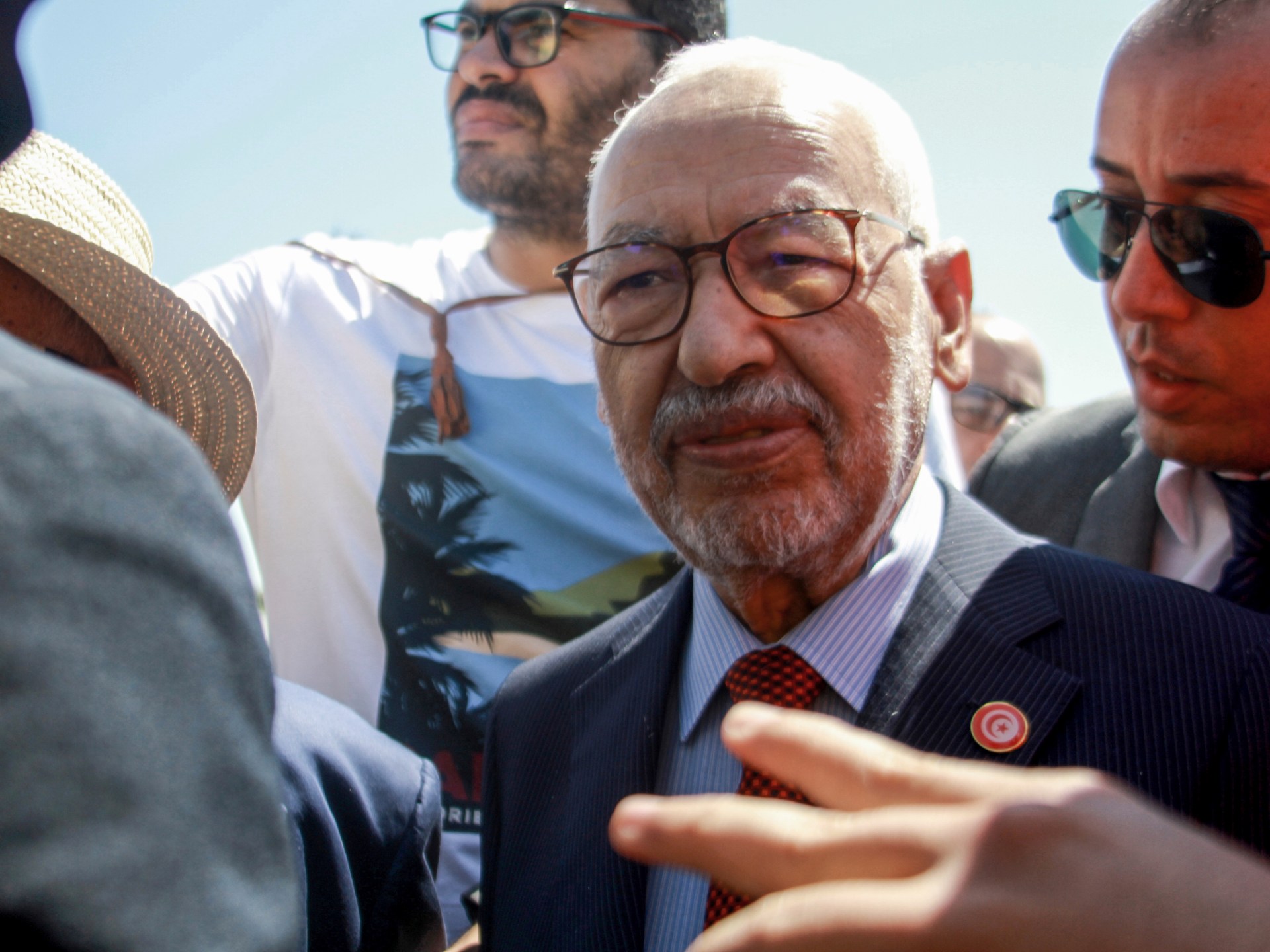
International Committee for Solidarity with Rached Ghannouchi decries ‘repressive campaign’ against Ennahdha party leader.
Marking the second anniversary of the arrest of Tunisia’s prominent opposition leader Rached Ghannouchi, an international committee formed last year to raise awareness about his imprisonment says he is being held “unjustly” and on “trumped-up charges”.
The International Committee for Solidarity with Rached Ghannouchi called for the immediate release of the imprisoned Ennahdha party leader and former speaker of Tunisia’s parliament.
In a statement on Thursday, it said that more than 15 cases have been brought against Ghannouchi, and “several unjust convictions and sentences” have been issued.
The most recent of these was a 22-year prison sentence issued in February on charges that included plotting against state security – a case “to which he has no connection”, the committee said.
Earlier this year, Ghannouchi was also sentenced to three years for accusations that his party received foreign contributions.
The 83-year-old, who has been the main rival of Tunisian President Kais Saied, was arrested in April 2023 and sentenced to one year in prison on charges of incitement.
He has been a vocal critic of Saied, and became the highest-profile figure to be arrested in the continuing consolidation of power by the president who was elected in 2019 and has overseen a wave of repression and legal reforms that have expanded his rule.
“These unjust trials and sentences take place within the context of a widespread repressive campaign led by Kais Saied’s regime, which is targeting opposition voices from all backgrounds, repressing organised action in all its forms, controlling the media and civil society, and silencing critical voices,” the committee said in its statement.
It said Saied’s government has to “exploit the judiciary as a tool for settling political scores”.
‘An era of political prisoners’
The committee’s statement comes just days after United States-based Human Rights Watch (HRW) called on the Tunisian government to halt its crackdown on opposition and free all detainees.
The rights group said arbitrary detention was being used to eliminate dissent in Tunisia amid a trial of prominent opposition figures – including Ghannouchi – on conspiracy charges.
In a report released Wednesday, HRW reinforced opposition leaders’ concern over what they call the authoritarian rule of Saied since he dissolved parliament in 2021 and began ruling by decree.
The opposition described Saied’s move as a coup. He has denied such accusations, professing he would not become a dictator but rather is trying to rescue the North African country from political chaos and rampant corruption.
The report said Tunis had turned arbitrary detention into a cornerstone of repressive policy.
“Saied’s government has returned the country to an era of political prisoners, robbing Tunisians of hard-won civil liberties,” said Bassam Khawaja, deputy Middle East and North Africa director at HRW.
Since 2023, authorities have arrested dozens of prominent political opposition figures as well as journalists, activists and lawyers in a crackdown critics say has undermined the democracy gained in the 2011 Arab Spring popular uprising.
Middle East
At least one killed by Israeli strike near Sidon in southern Lebanon | Israel attacks Lebanon News
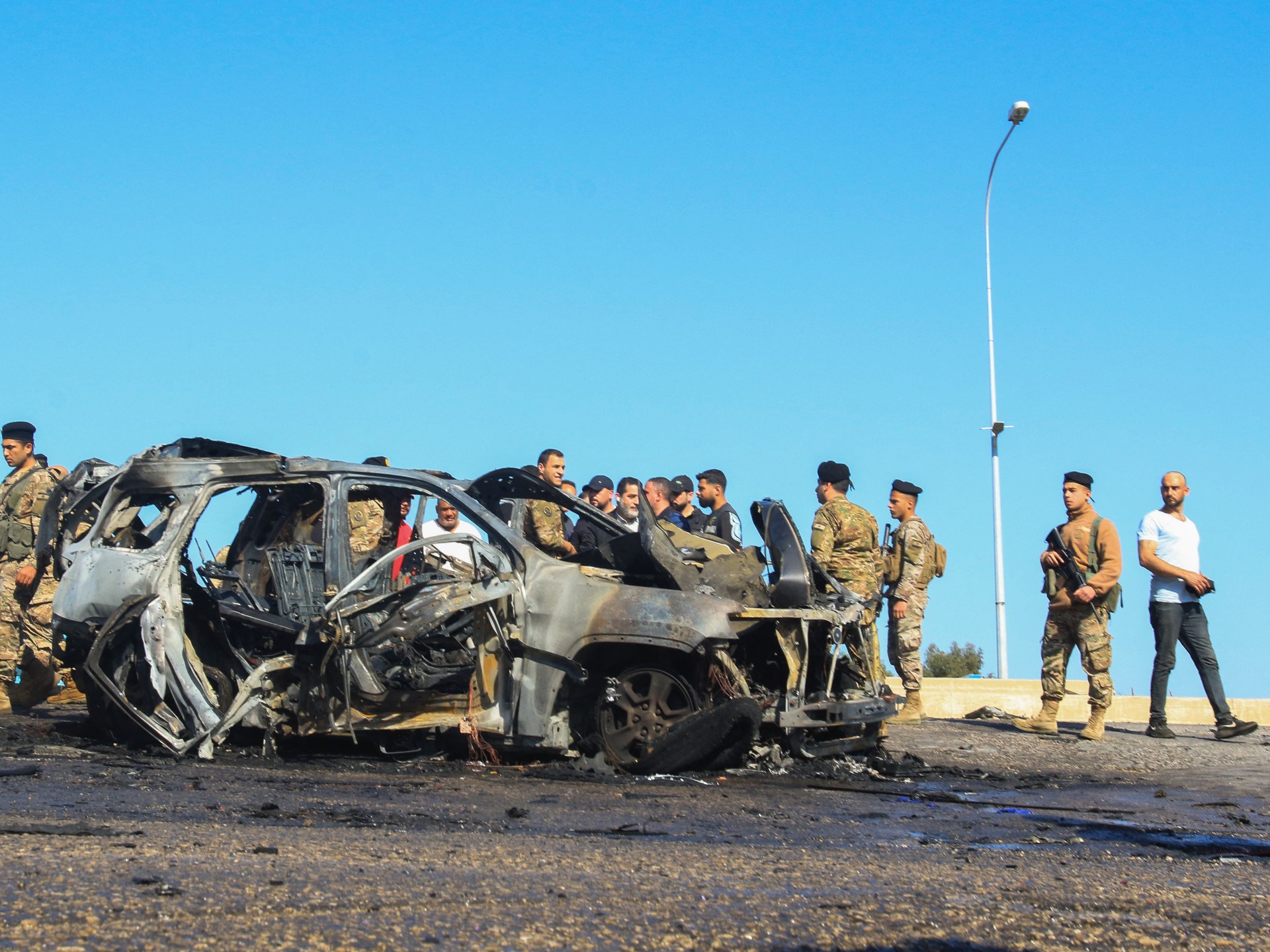
Israel has continued to conduct near-daily strikes in Lebanon despite a ceasefire with Hezbollah last November.
Lebanon’s Health Ministry has said an Israeli strike on a vehicle near the southern coastal city of Sidon killed one person, with Israel announcing that an attack in the same area had targeted a Hezbollah operative.
Despite a ceasefire last November that sought to halt more than a year of conflict between Israel and Iran-backed Hezbollah, Israel has continued to conduct near-daily strikes in Lebanon.
“The attack carried out by the Israeli enemy against a car on the Sidon-Ghaziyeh road resulted in one dead,” a Health Ministry statement said on the fourth consecutive day of Israeli attacks in the south on Friday.
An AFP journalist said the Israeli attack hit a four-wheel-drive vehicle, sending a pillar of black smoke into the sky.
At the scene of the strike, members of the security forces stood guard as a crowd gathered to look at the charred remains of the vehicle after firemen put out the blaze.
Israel’s military later said it had killed a member of Hezbollah in the area.
“Earlier today [Friday], the IAF [Israeli air force] conducted a precise strike in the area of Sidon and eliminated the Hezbollah terrorist Muhammad Jaafar Mannah Asaad Abdallah,” a military statement said.
It added that Abdallah was “responsible, among other things, for the deployment of Hezbollah’s communication systems throughout Lebanon”.
The Israeli military also said it was behind other attacks this week that it claimed had killed Hezbollah members.
Civilians killed since ceasefire
Hezbollah, significantly weakened by the war, says it is adhering to the November ceasefire, even as Israeli attacks persist.
The United Nations says at least 71 civilians have been killed by Israeli forces in Lebanon since the ceasefire.
Thameen al-Kheetan, spokesperson for the UN Office for the High Commissioner for Human Rights (OHCHR), said on Tuesday that the death toll included 14 women and nine children. He called for investigations into “each and every military action where civilians are killed”.
Under the November ceasefire, Israel was to withdraw all of its forces from south Lebanon and Hezbollah was to pull its fighters back north of Lebanon’s Litani River and dismantle any remaining military infrastructure in the south. But despite the deal, Israeli troops have remained at five south Lebanon positions that they deem “strategic”.
Lebanon’s army has been deploying in the south near the border in regions where Israeli forces pulled back. Lebanese President Joseph Aoun told Al Jazeera on Monday that the army was “dismantling tunnels and warehouses and confiscating weapons bases” south of the Litani “without any problem from Hezbollah”.
On Thursday, a senior Hezbollah official told the Reuters news agency the group is ready to hold talks with the Lebanese president about its weapons if Israel withdraws from southern Lebanon and stops its strikes.
Separately, a Hezbollah official said on Friday that the group categorically refused to discuss handing over its weapons to Lebanon’s army unless Israel withdrew completely from the south and stopped its “aggression”.
“Wouldn’t it be logical for Israel to first withdraw, then release the prisoners, then cease its aggression … and then we discuss a defensive strategy?” Wafiq Safa said in an interview with Hezbollah’s Al Nur radio station.
“The defensive strategy is about thinking about how to protect Lebanon, not preparing for the party to hand over its weapons.”
-

 Conflict Zones1 day ago
Conflict Zones1 day agoHaiti in ‘free fall’ as violence escalates, rights group warns | Armed Groups News
-

 Africa2 days ago
Africa2 days agoRobot waiter becomes a star attraction at Havana restaurant
-

 Sports2 days ago
Sports2 days agoDagestan: Why this region of Russia produces so many MMA champions
-
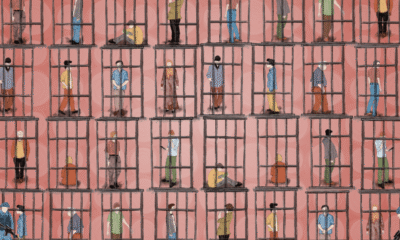
 Conflict Zones2 days ago
Conflict Zones2 days agoA nation behind bars: Why has Israel imprisoned 10,000 Palestinians? | Israel-Palestine conflict News
-

 Sports1 day ago
Sports1 day agoJu Wenjun: Chinese grandmaster makes history by winning fifth Women’s World Chess Championship
-

 Sports2 days ago
Sports2 days agoArsenal reaches first Champions League semifinal in 16 years, with Inter Milan also advancing
-
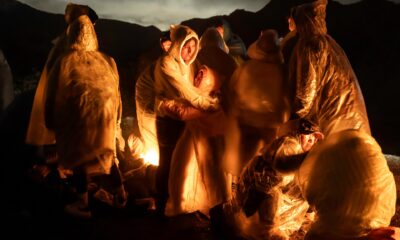
 Middle East2 days ago
Middle East2 days agoPalestinian photographer Samar Abu Elouf wins world’s top photo prize | Gaza News
-

 Sports1 day ago
Sports1 day agoAaron Boupendza: 28-year-old former MLS player dies after falling from 11th floor balcony in China




